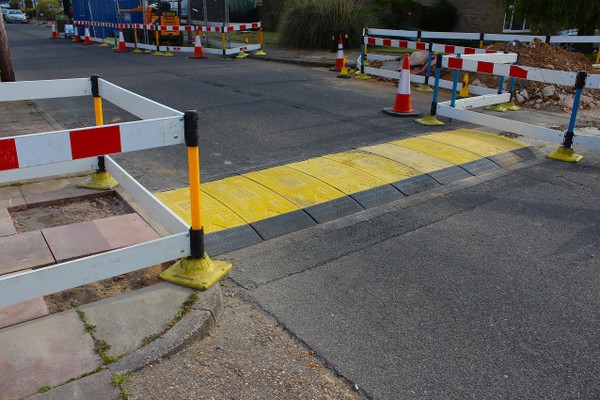Some Known Facts About Road Plates.
Wiki Article
The Best Guide To Steel Road Plate
Table of ContentsFacts About Road Plates UncoveredThe Ultimate Guide To Steel Road PlatesThe Single Strategy To Use For Road PlatesHow Road Plates can Save You Time, Stress, and Money.
Box culverts are economical due to their strength as well as monolithic activity as well as different structures are not needed. It is utilized in unique situations, weak foundation.Normal compaction needs for a project might vary from 90% to 95% of standard Proctor for non-structural locations to 98% or even more of modified Proctor for heavily crammed pavements. Proctor examinations are dirt moisture-density partnership tests that establish optimum dry thickness (the unit weight of the soil minus the weight of water) as well as the maximum water content for dirt samples.
Water is included to four to six parts of the dried out soil sample in increasing amounts. The completely dry thickness enhances as the included wetness oil the dirt fragments and also enable greater compaction from the exact same applied energy.

The Best Strategy To Use For Steel Road Plate
The wetness web content is identified using a gas-pressure dampness tester or simple field dry-back techniques. Thickness and moisture outcomes are plotted against the initial lab curve to confirm a match. In situations where research laboratory info is not offered, the area factor results might be contrasted to a family of contours put together from local or regional dirt data to choose the very best maximum thickness as well as optimum moisture curve.A soil compaction examination uses among several methods to measure the dry density and also moisture material of the dirt in position. The 3 most typical are talked about below - steel road plates. Results from these field tests are compared to the Proctor examination outcomes of the exact same soil established busy and the proportion is revealed as the percent compaction.
1ft (2,830 g/cm). Density examination accessories such as clubs, scoops, knives, and example bags are used throughout excavation. All the dug deep into product is very carefully gathered as well as saved in a closed container. The pre-weighed Sand Cone Density Apparatus is inverted onto the base plate and also the metal cone is snuggled right into the base plate opening.
Later, the partly loaded device is considered once more, and also the quantity of the test hole is computed by dividing the mass of the sand filling the hole by the mass density of the sand. The damp weight of the recouped excavated soil is separated by the examination hole volume to establish the wet density.
The Best Strategy To Use For Steel Road Plates
The percent compaction for the field thickness examination is calculated by splitting the dry density of the soil by the maximum dry thickness from the proctor examination. Pros, Disadvantages, Accurate and reputable; a lengthy background of approved use, Tests may take half an hour or more to finish, ASTM conventional examination method, Heavy devices in the location might need to stop procedure briefly, Does not require substantial training, Different tests should be utilized where muches of +1 - road plate.
The tests are a little bit easier to do than the sand cone and also can be duplicated swiftly because the water is retained in the vessel. Pros, Disadvantages, Accurate and trusted; a long history of approved usage, Examinations may take 15-20 mins or even more to complete, ASTM typical examination approach, Balloon membrane layers can penetrate during testing, Does not call for considerable training, Meant for fine-grained or granular soils without muches of crude product, No licensing or permitting needed for usage, Ought to not be utilized to check soft saturated, extremely plastic dirts, Several tests can be performed without transforming thickness media, All excavated product should be meticulously eliminated, Tools is cost-efficient Wetness content and unit weight need to be done on maintained soil samples from either a sand cone or rubber balloon tests to finish estimations for soil compaction.
The graph listed below shows a couple of various methods that can be used for wetness determinations and there are a range of road plate scales and also balances that can be used for evaluating soil samples in lab or field setups. Nuclear thickness gauges establish dirt thickness by measuring gamma radiation transmission in between a probe consisting of a contaminated Cesium 137 (or various other) resource and also Geiger-Mueller discovery sensing units in the base of the scale.
Road Plates Things To Know Before You Get This
Soil wetness is determined at the same time using a separate source of Americium 241. A steel rod is driven right into the soil at the examination site, developing a pilot opening. The probe containing the contaminated source is lowered approximately 12in (305mm) into the pilot opening, and radiation transmission is gauged for one min.
Report this wiki page